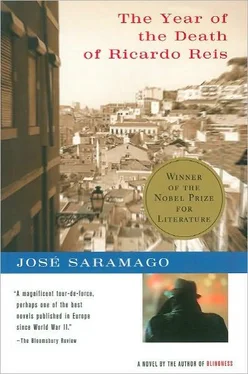José Saramago - Year of the Death of Ricardo Reis
Здесь есть возможность читать онлайн «José Saramago - Year of the Death of Ricardo Reis» весь текст электронной книги совершенно бесплатно (целиком полную версию без сокращений). В некоторых случаях можно слушать аудио, скачать через торрент в формате fb2 и присутствует краткое содержание. Год выпуска: 1992, ISBN: 1992, Издательство: Houghton Mifflin Harcourt, Жанр: Современная проза, на английском языке. Описание произведения, (предисловие) а так же отзывы посетителей доступны на портале библиотеки ЛибКат.
- Название:Year of the Death of Ricardo Reis
- Автор:
- Издательство:Houghton Mifflin Harcourt
- Жанр:
- Год:1992
- ISBN:9780547546926
- Рейтинг книги:4 / 5. Голосов: 1
-
Избранное:Добавить в избранное
- Отзывы:
-
Ваша оценка:
- 80
- 1
- 2
- 3
- 4
- 5
Year of the Death of Ricardo Reis: краткое содержание, описание и аннотация
Предлагаем к чтению аннотацию, описание, краткое содержание или предисловие (зависит от того, что написал сам автор книги «Year of the Death of Ricardo Reis»). Если вы не нашли необходимую информацию о книге — напишите в комментариях, мы постараемся отыскать её.
Year of the Death of Ricardo Reis — читать онлайн бесплатно полную книгу (весь текст) целиком
Ниже представлен текст книги, разбитый по страницам. Система сохранения места последней прочитанной страницы, позволяет с удобством читать онлайн бесплатно книгу «Year of the Death of Ricardo Reis», без необходимости каждый раз заново искать на чём Вы остановились. Поставьте закладку, и сможете в любой момент перейти на страницу, на которой закончили чтение.
Интервал:
Закладка:
Upon entering his room, Ricardo Reis sees that the bed has been prepared, the bedspread and sheet neatly tucked back at an angle, discreetly, not that unsightly clutter of bedclothes tossed aside every which way. Here there is merely a suggestion, should he wish to lie down, his bed is ready. Not just yet, first he must read the one and a half stanzas he left on the sheet of paper, examine them critically, look for the door that this key, if key it is, can open, and imagine other doors beyond, doors locked and without a key. In the end, after much persistence he found something, it had been left there out of weariness, his or someone else's, but whose, and so the poem ended, Neither tranquil nor troubled, I wish to lift my being high above this place where men know pleasure and pain , the pause in the middle, the spondee, should be changed. Good fortune is a burden that oppresses the happy man, because it is no more than a particular state of mind. He then went to bed and fell asleep at once.
...
Ricardo Reis had told the manager, I would like breakfast brought up to my room at nine-thirty. Not that he intended to sleep so late, but he wished to avoid having to jump out of bed half-awake, struggling to slip his arms into the sleeves of his dressing gown, groping for his slippers, and feeling panic that he wasn't moving quickly enough to satisfy whoever was standing outside his door, arms laden with a huge tray bearing coffee and milk, toast, a sugar bowl, perhaps some cherry preserve or marmalade, a slice of dark grainy quince paste, a sponge cake, brioches with a fine crust, crunchy biscuits, or slices of French toast, those scrumptious luxuries served in hotels. We shall soon learn if the Brangança goes in for such extravagance, because Ricardo Reis is about to sample his first breakfast. It would be nine-thirty on the dot, Salvador promised him, and did not promise in vain, for here at nine-thirty on the dot Lydia is knocking on the door. The observant reader will say that this is impossible, she has both her arms occupied, but we would be in a sorry state if we had to hire only servants who possess three arms or more. This maid, without spilling a drop of milk, manages to knock gently with her knuckles, while the hand belonging to those knuckles continues to support the tray. One must see this to believe it, as she calls out, Your breakfast, Doctor, which is what she was instructed to say, and although a woman of humble origins, she has not forgotten her instructions. If Lydia were not a maid, there is every indication that she would make an excellent tightrope walker, juggler, or magician, for she has talent enough for any of those professions. What is incongruous about her is that, being a maid, she should be called Lydia and not Maria. Ricardo Reis is already dressed and presentable, he has shaved and his dressing gown is tied at the waist. He even left the window ajar to air the room, for he detests nocturnal odors, those exhalations of the body from which not even poets are exempt. The maid finally entered, Good morning, Doctor, and proceeded to put down the tray, less lavish in its offerings than he had imagined. Nevertheless, the Brangança deserves an honorable mention, and it is no wonder that some of its guests would never dream of staying at any other hotel when they visit Lisbon. Ricardo Reis returns the greeting, then dismisses her, No, many thanks, that will be all, the standard reply to the question every good maid asks, Can I get you anything else, sir. If the answer is no, she must withdraw politely, backing away if at all possible, for to turn your back would be to show disrespect to one who pays your wages and gives you a living. But Lydia, who has been instructed to be especially attentive to the doctor's needs, goes on to say, I don't know if you have noticed, Doctor, but the Cais do Sodré is under water. Trust a man not to notice, the water could be forcing its way under his door and he wouldn't see it, having slept soundly all night. He woke up as if he had only been dreaming about the rain. And even in a dream he would not dream that there has been so much rain that the Cais do Sodré is flooded. The water comes up to the knees of a man who finds himself obliged to cross from one side to the other, barefoot, his clothes hitched up, carrying an elderly woman on his back through the flood, she much lighter than the sack of beans carried from the cart to the warehouse. Here at the bottom of the Rua do Alecrim the old woman opens her purse and finds a coin, with which she pays Saint Christopher, who has already gone paddling back into the water, for on the other side there is already someone else making frantic gestures. The second person is young and sturdy enough to cross on his own, but, being smartly dressed, he has no desire to get his clothes dirty, for this water is more like mud than water. If only he could see how silly he looks riding piggyback with his clothes all crumpled, his shins exposed, revealing green garters over white long underwear. Some are laughing now at the spectacle, in the Hotel Brangança, on the second floor, a middle-aged guest is grinning, and behind him, unless our eyes are deceiving us, stands a woman also grinning, yes, a woman, without a shadow of doubt, but our eyes do not always see right, because this one appears to be a maid. It is hard to believe that that is really her station, unless there has been some dangerous subversion of social class and ranking, a thing greatly to be feared, we hasten to add, yet there are occasions, and if it is true that occasion can turn a man into a thief, it can also cause a revolution such as the one we are witnessing. Lydia, daring to look out of the window, stands behind Ricardo Reis and laughs, as if she were his equal, at a scene they both find amusing. These are fleeting moments of a golden age, born suddenly and dying at once, which explains why happiness soon grows weary. The moment has already passed, Ricardo Reis has closed the window, Lydia, once more simply a maid, backs toward the door. Everything must now be done in haste because the slices of toast are getting cold and no longer look quite so appetizing. I shall ring for you to come and remove the tray, Ricardo Reis tells her, and this happens about half an hour later. Lydia quietly enters and quietly withdraws, her burden not as heavy, while Ricardo Reis pretends to be absorbed as he sits in his room leafing through the pages of The God of the Labyrinth without actually reading.
Today is the last day of the year. Throughout the world where this calendar is observed, people amuse themselves by weighing the resolutions they intend to put into practice during the incoming year. They swear that they will be honest, just, and forbearing, that their reformed lips will utter no more words of abuse, deceit, or malice, however much their enemies may deserve them. Clearly we are speaking about the common people. The others, uncommon and superior, have their own good reasons for being and doing quite the opposite whenever it suits or profits them, they do not allow themselves to be deceived, and laugh at us and our so-called good intentions. In the end we learn from experience, no sooner is January upon us than we forget half of what we promised, and then there is little point in trying to carry out the rest. It is rather like a castle made of cards, better for the upper part to be missing than have the whole thing collapse and the four suits mixed up. This is why it is questionable whether Christ departed from life with the words we find in the Holy Scriptures, those of Matthew and Mark, My God, my God, why hast Thou forsaken me, or those of Luke, Father, into Thine hand I commit my spirit, or those of John, It is fulfilled. What Christ really said, word of honor, as any man on the street will tell you, was, Good-bye, world, you're going from bad to worse. But the gods of Ricardo Reis are silent entities who look upon us with indifference and for whom good and evil are less than words, because they never utter them, and why should they, if they cannot even tell them apart. They journey like us in the river of things, differing from us only because we call them gods and sometimes believe in them. We were taught this lesson lest we wear ourselves out making new and better resolutions for the incoming year. Nor do the gods judge, knowing everything, but this may be false. The ultimate truth, perhaps, is that they know nothing, their only task being precisely to forget at each moment the good as well as the evil. So let us not say, Tomorrow I shall do it, for it is almost certain that tomorrow we will feel tired. Let us say instead, The day after tomorrow, then we will always have a day in reserve to change our mind and make new resolutions. It would be even more prudent, however, to say, One day, when the day comes to say the day after tomorrow, I shall say it, but even that might not prove necessary, if definitive death comes first and releases me from the obligation, for obligation is the worst thing in the world, the freedom we deny ourselves.
Читать дальшеИнтервал:
Закладка:
Похожие книги на «Year of the Death of Ricardo Reis»
Представляем Вашему вниманию похожие книги на «Year of the Death of Ricardo Reis» списком для выбора. Мы отобрали схожую по названию и смыслу литературу в надежде предоставить читателям больше вариантов отыскать новые, интересные, ещё непрочитанные произведения.
Обсуждение, отзывы о книге «Year of the Death of Ricardo Reis» и просто собственные мнения читателей. Оставьте ваши комментарии, напишите, что Вы думаете о произведении, его смысле или главных героях. Укажите что конкретно понравилось, а что нет, и почему Вы так считаете.












